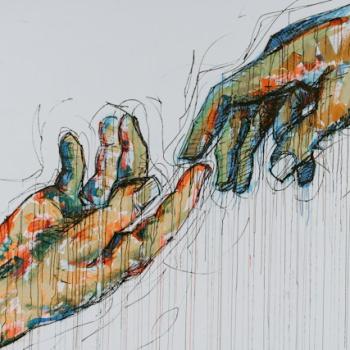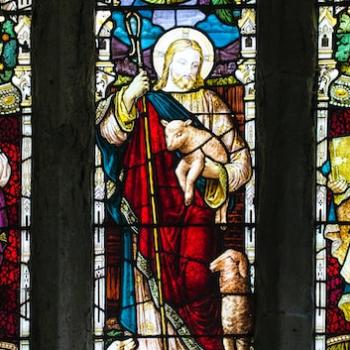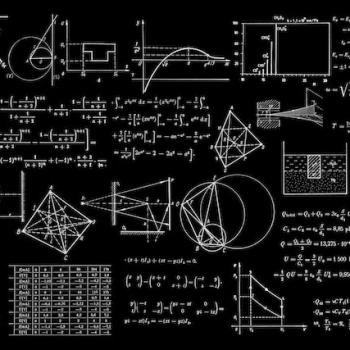The gospel reading on the Fourth Sunday of Lent is all about what it means to see . . . and how what we see makes us who we are.

In this week’s lengthy passage from John, Jesus heals a man blind from birth. He spits on the ground and rubs the resulting paste on the man’s eyes. He then instructs him to go wash in the Pool of Siloam. Three defining features in this story provide three guideposts that point us to the heart of the Christian worldview itself.
What Causes Suffering?
When Jesus sees the blind man, his disciples don’t say, “Teacher, can you help him?” or “Rabbi, is there something we do?” Instead, they ask, “Rabbi, who sinned, this man or his parents,
that he was born blind” (John 9:2). It’s almost like he’s not an actual person, just a specimen to be examined in order to test a hypothesis.
But can we really blame them? Isn’t it our own instinct to ask, “Why did this horrible thing happen?” whenever we suffer? Of course, it is – we are hard-wired to do that. The human brain throughout evolutionary history has needed to assign a cause for every effect, a source of every outcome.
Jesus’ Answer
The Hebrew and Christian Scriptures illustrate part of the evolution of our understanding of suffering. During the time the Old Testament was written, suffering was thought to be caused by sin. But whose? The person in pain? Or someone in his ancestral line?
We aren’t all that different today, are we? Since its publication in 1982, several million people have purchased Harold Kushner’s book, Why Bad Things Happen to Good People. We too seem to have a visceral sense that a good person should have good outcomes. But anyone who has lived past the age of diapers and teething rings know it’s doesn’t always work like this.
Jesus’ answer is crystal clear: “Neither he nor his parents sinned” (3).
“Well, then why?” we still ask. And it’s a valid question. Some say that it’s part of God’s “plan,” or that God wants to “teach us a lesson” or “make us stronger.” Personally, I think all of those explanations are were less than the dirt Jesus spit into in this story. I think Life just is. Suffering is a part of Life. Suffering just is. I have much more to say on that elsewhere!
Earthen Vessels
The other glaring fact from this tale that sticks out like a sore thumb is the way Jesus heals the blind man. No loud proclamation of “Open your eyes and see!” No triumphant, theatrical announcement of, “Be opened!” Instead, Jesus spat on the ground, made a paste in the mud, and applied it to the man’s eye. He then told him to wash the muddy substance from his face, and when he did, he was able to see.
So, if we have no fireworks or stunning visual production, no opening performance by The Rolling Stones or Elton John, then what do we have going on here? We have spit and dirt. We have Earth and water. I believe the message is clear. Miracles aren’t divine interruptions into human life. Miracles are the moments when we realize that life in all its muddy earthiness is already divine. No interruptions needed.
Sacred vs. Secular?
Put another way, the central truth of the Incarnation is that everything is sacred if only we have the eyes to see it that way. Absolutely everything, like spit, mud, and water. As Elizabeth Barret Browning wrote, “Earth’s crammed with heaven.” I think this is the message of the story of the man born blind.
Through a Glass Darkly
The third extraordinary element in this story is that no one believes that this miracle has happened. How can he see so suddenly upon his encounter with Jesus when has never seen before?
The Pharisees think there are some hijinks afoot, so they ask the guy’s neighbors who very helpfully say gee, I don’t know, maybe it’s just someone who looks like the blind guy.
Then they question the man’s parents who are afraid of getting in trouble, so they buy time by saying Well, he’s a grown-up guy now, so why don’t you ask him yourself?”
The Truth Shall Set You Free
After all the clumsy Perry Mason interrogations, Jesus makes it clear that he came for the express purpose of helping the blind see. Those who think they have keen sight, like the Pharisees who felt sure they always knew who was on the naughty list, turn out to be blind as bats.
But the fact remains . . . seeing – really, truly seeing with the eyes of Christ and allowing ourselves to be transformed by that vision – is not for wimps. You might encounter people who question your reasoning abilities. You could have people think you’re weird. You may even lose friends. Seeing leads to doing. And doing has consequences.
A Triad of Truth
The gospel reading this fourth Sunday of Lent is all about seeing, and it provides some telling if not quirky clues into how to improve our vision. First, forget trying to figure out the source of suffering. It isn’t you, your parents, or your ancestors. It just is. The vision for people of faith is one in which suffering simply is.
Second, there is no celestial realm separate from our daily experience. The spit and mud, the morning commute and overdue bills, the family vacations and the first day of school photos ARE the celestial realm. It’s just a matter of seeing them the right way.
And finally, we will always question what we see. We will always try to pass the buck. We will say, “Maybe it’s someone who looks like me” or “I don’t know – go ask my parents.” Being an authentic human who truly sees is freakishly scary. And we do scared well.
But there is spit and dirt and water to wash it all off, then we’ll be okay. Maybe that’s all we really need.












